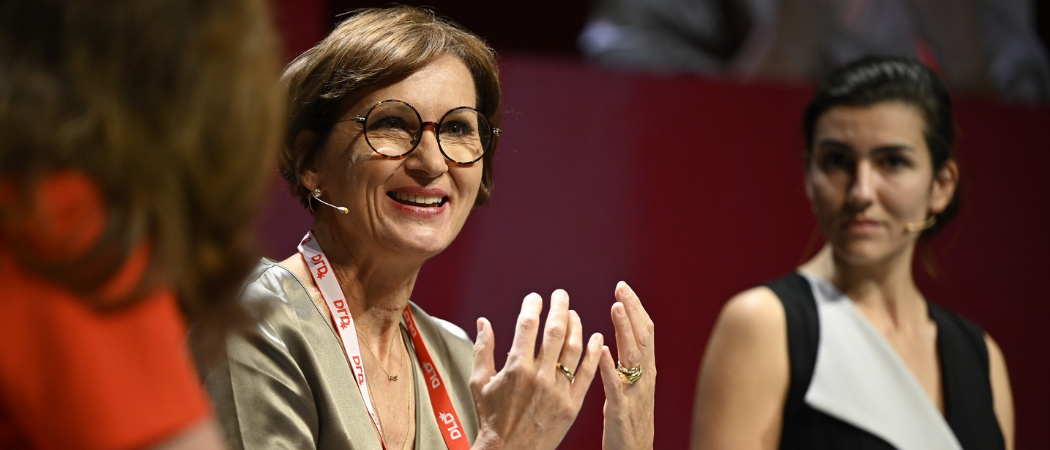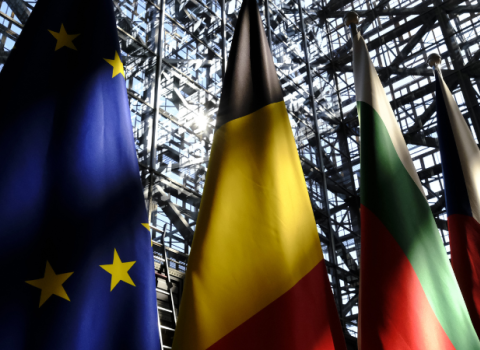A position paper from the German Federal Ministry of Education and Research aims to combine academic freedom and national security. The Alliance of Science Organisations in Germany reacts cautiously, while the response from the defence industry is much more positive.

Bettina Stark-Watzinger, German federal minister for education and research at DLD Munich Conference 2022, May 2022. Photo credits: Hubert Burda Media / Flickr
Science|Business - Table.Media partnershipScience|Business has partnered with Table.Media, a leading source of news about higher education and research in Germany. Each week, we are publishing one of each other’s stories to give readers an even broader range of insight into R&D policy across Europe. |
"We are experiencing a Zeitenwende [turning point] that is affecting many areas of our lives. The Russian war of aggression against Ukraine and its far-reaching repercussions are one of the main reasons for this," declares a new research security position paper published by the Federal Ministry of Education and Research (BMBF) on March 15.
"In parallel, we must strengthen the technological sovereignty of Germany and Europe," it says. A "comprehensive process" must safeguard scientific freedom, minimise risk and open up room for cooperation between civilian and military research, a BMBF spokesperson said.
The BMBF is engaged in "intensive dialogue with relevant stakeholders in the science system", including a workshop in July 2023 at which "numerous ideas were gathered". Another important step was an exchange with the Alliance of Science Organisations regarding standards, structures, procedures and awareness-raising on research security in March 2024.
The BMBF intends to continue this dialogue. "Further discussions with relevant government agencies, which we cannot anticipate at this stage, have already been announced."
The position paper contains several recommendations. The first is that the sometimes strict separation between civilian and military research in Germany needs to be scrutinised. This year's Munich Security Conference and the annual report of the Expert Commission on Research and Innovation made this clear.
The BMBF will also examine to what extent funding incentives for increased cooperation between civilian and military research is sensible in suitable areas. However, there are no plans to provide funding for targeted military research.
Although top-level research is no longer conceivable without international cooperation, measures must be taken to safeguard research security – albeit proportional to the risks, it says.
The aim is to create and anchor a broader awareness and knowledge of the risks in the scientific system that research is increasingly exposed to. The BMBF will actively support the scientific community in reviewing and further developing guidelines and instruments.
The BMBF also proposes a central research safety information platform and a clearing centre to support scientific staff and scientific institutions in managing the risk of safety-critical technologies in international research collaborations.
The aim is to have an open and unbiased discussion on whether the various civil clauses, which prohibit dual-use research taking place at German universities, are still adequate given the changed geopolitical conditions, and how civil clauses can be designed effectively.
Civil clauses ‘de facto bans on defence research’
Hans Christoph Atzpodien, managing director of the Federation of German Security and Defence Industries (BDSV), sees the BMBF's initiative as absolutely commendable in light of Germany's "Zeitenwende" – the “epochal shift”, as chancellor Olaf Scholz put it, in German security following Russia’s invasion of Ukraine in 2022.
The BDSV represents around 200 companies such as Airbus, Diehl Defence, and Heckler and Koch, and they need collaborating research institutions to apply the same security standards, he said.
"We particularly welcome the clear statement in the BMBF position paper that the so-called civilian clauses still practiced at over 70 German universities, which in fact mask bans on military or armaments-related research, are no longer compatible with the changed geopolitical framework around us," says Atzpodien.
The BDSV considers these bans an expression of a former zeitgeist, no longer compatible with the minister of defence's call for a combat-ready German armed force, and the need for society as a whole to embrace resilience.
Science alliance less enthusiastic
"The position paper is being discussed," said Christina Beck, head of communications at the Max Planck Society, which currently chairs the Alliance of Science Organisations in Germany.
According to Beck, all organisations currently consider how to achieve greater research security without overly restricting research itself. All measures must therefore be carefully thought through and ultimately implementable in everyday practice. "The Alliance is in dialogue with the BMBF."
The German Academy of Science and Engineering (acatec) welcomed the BMBF's initiative. A spokesperson said that the overall aim of the proposal is to foster debate within scientific self-governance.
In June 2022, acatech highlighted this need for reflection and self-regulation in its "Security, Resilience, Sustainability" position paper.
"Greater cooperation between the many research institutions on these complex issues would be welcome, so that a self-learning system can emerge from many different approaches. In general, the readjustment of priorities in this area belongs to scientific self-governance,” it recommended.
This text appeared for the first time in Research.Table, a professional briefing from the largest independent start-up for quality journalism in Germany. The editorial team reports for the key people in the research scene who set and fill the framework for science, research and development.






 A unique international forum for public research organisations and companies to connect their external engagement with strategic interests around their R&D system.
A unique international forum for public research organisations and companies to connect their external engagement with strategic interests around their R&D system.